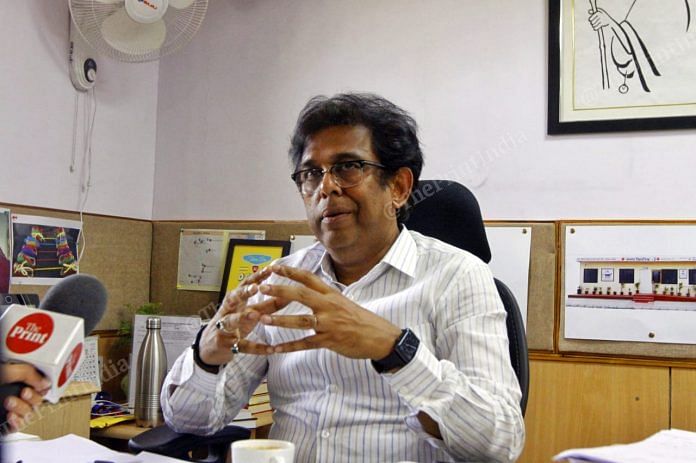New Delhi: As India battles to flatten the curve of coronavirus infections in the country, health workers from several parts of the country have complained of a shortage in personal protective equipment (PPE) — but not Rajasthan.
In an interview to ThePrint, Rajasthan’s Additional Chief Secretary, Health, Rohit Kumar Singh said strong procurement systems of a health scheme launched in 2013 saved them from a shortage.
“The Mukhyamantri Nishulk Dava Yojana — a free drug scheme — has ensured that our procurement systems are robust, and that the question of where to buy from is answered. The Rajasthan Medical Supplies corporation buys equipment worth Rs 1,000 crore every year,” said Singh, adding, “When we realised that this problem would arise, we planned in advance and that’s why we don’t have a shortage now.”
Rajasthan is currently among the states with the highest infection rates. As of 13 April, the number of cases is 751, but the state authorities claims to have quickly identified the hotspots and ensured adequate testing.
Singh said the numbers could go up in the next few weeks but there was nothing to panic. He said Rajasthan is doing a lot more tests compared to other states, and that increases the chances of more positive cases.
“The number of cases will rise for two reasons: One is that we’ve done about 30,000 tests, which is a higher rate of testing per million than any other state. The only state to have done more tests than us is Maharashtra. Plus, if you test more in the containment zones, you will get more positive results,” said Singh.
On lockdown, Singh said there should be a “graded” approach.
“It’s complex because the economy is interlinked, supply chains are interlinked, it’s a difficult ball game but we will have to have a graded strategy,” he said.
How Nirogi Rajasthan scheme helped
When the lockdown was imposed, Rajasthan had only 27 cases in the state, and has recorded an exponential rise in cases in a short period of time.
A scheme launched in December 2019 — Nirogi Rajasthan — that was to check the health of every citizen in the state meant healthcare workers were trained to go door to door. This eventually enablled them to handle the Covid-19 crisis on a war footing, Singh said. He, however, added that much of its handling of the crisis has been in learning to adapt as circumstances change.
“We need to constantly change our testing strategy as the situation evolves. From April 15 onwards, we will run the confirmatory RT-PTR test on a contact or second level contact. Then, we will screen those in the buffer zones, where the probability of a positive result is a little low, with the rapid antibody test.”
Those who are vulnerable — having comorbid conditions or flu-like symptoms — will be given first priority.
Also read: Doctors, hospital workers are also fighting abuse and violence as virus stigma, panic grows
‘Need central assistance with kits’
Singh is optimistic the state will successfully curb the spread of the virus, but said it will require some additional assistance from the central government.
“We’re sourcing RT-PCR kits from the ICMR, and if we had a more continuous supply of the kits we would be okay,” said Singh. “For rapid testing, the ICMR has put out a list of approved suppliers, most of which are from China and the East. If they could get a bulk order and then distribute it to the states, it would help us do it faster.”
Singh also sees the crisis as an opportunity to strengthen the state’s public health systems, in terms of physical infrastructure, training personnel, as well as public service delivery.
“The key lies in implementation, not so much in the model and planning.”
Also read: A woman reads the Quran, 13-yr-old says ‘I’m scared’: How Jaipur is dealing with Covid-19



